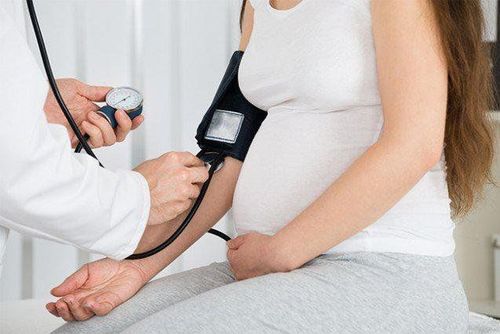This is an automatically translated article.
Posted by Master, Doctor Le Nhat Nguyen - Department of Obstetrics and Gynecology - Vinmec Danang International Hospital
According to statistics, about 6% of pregnant women have high blood pressure during pregnancy. Gestational hypertension has the potential to progress to preeclampsia, endangering the life of the mother and fetus, and therefore requires special monitoring.
1. Find out the phenomenon of high blood pressure in pregnant women
According to statistics, about 10 - 15% of pregnant women have high blood pressure, of which about 0.2% have a preeclampsia attack. High blood pressure is not only dangerous to the fetus because about 9% of children born to women with high blood pressure die in utero, about 15% are malnourished, but it is also the third leading cause of maternal death.
A woman is diagnosed with maternal hypertension when her systolic blood pressure is greater than or equal to 140 mmHg and or diastolic blood pressure is greater than or equal to 90 mmHg.
Blood pressure is checked over 2 measurements in a woman in a semi-sitting and resting position. When pregnant women have severe hypertension, equal to or greater than 160 /100 mmHg, requiring hospitalization, moderate hypertension (less than 160 /100 mmHg) can be closely monitored as outpatients.

2. How is hypertensive pregnancy diagnosed?
There are 5 groups of hypertensive disorders in pregnancy including:
Gestational hypertension (Transient hypertension) Pre-eclampsia Eclampsia Pre-eclampsia in patients with chronic hypertension Chronic hypertension For Common symptoms of high blood pressure in pregnancy are:
Women who have had a baby, especially younger than 20 years of age The risk increases with the age of the pregnant woman older than 40 years of age Family history of pregnancy Seizures or hypertension Pre-existing hypertension Multiple pregnancy : Multiple pregnancy, twins, or triplets... Pregnancy with diabetes, kidney disease Ovulation Severe Rhesus sensitization, American ethnicity Fly.

Pregnant women with early diagnosis of gestational hypertension as well as timely treatment can prevent many dangerous complications later. Pregnant women also need to update their knowledge about the symptoms of this disease so that they can have medical intervention early.
3. Counseling about future pregnancies
Women with high blood pressure during pregnancy should be monitored for many months postpartum and counseled about future pregnancies and future cardiovascular disease risk.
The longer high blood pressure persists after birth, the higher the risk of developing chronic high blood pressure. Gestational hypertension usually returns to normal up to 12 weeks postpartum, if it persists it is considered chronic hypertension
Women who have had pre-eclampsia are at risk of having it again in another pregnancy to higher than normal. The earlier preeclampsia manifests and is diagnosed, the higher the chance of preeclampsia in future pregnancies. Women who have had multiple births and have pre-eclampsia are more likely to have pre-eclampsia in their next pregnancy than women who have just had their first pre-eclampsia.
If you have high blood pressure during pregnancy, schedule an appointment with your obstetrician in advance so that you can monitor the health of the mother and baby throughout the pregnancy. Your weight and blood pressure will be checked at each visit, and you may need regular blood and urine tests as ordered by your doctor.
The doctor will closely monitor the health of the fetus. Ultrasound is used to observe the growth and development of the baby. Fetal heart rate monitoring can be used to assess health. Your doctor may also advise you to monitor your baby's daily movements.

In addition, pregnant women should also take good care of themselves as the best way to take care of the baby:
Visit the antenatal clinic regularly throughout the pregnancy Take blood pressure medication and other drugs as prescribed by the doctor Doctor Follow your doctor's recommendations for physical activity such as yoga for pregnant women, gentle exercise. Eat a healthy, complete, fiber-rich diet, choosing foods that are low in sodium. Knowledge of taboos such as: Avoid smoking, alcohol and drugs. Talk to your doctor before taking any over-the-counter medication. At Vinmec International General Hospital, there is a package maternity service as a solution to help pregnant women feel secure because of the companionship of the medical team throughout the pregnancy. When choosing Package Maternity, pregnant women can:
The pregnancy process is monitored by a team of qualified doctors Regular check-up, early detection of abnormal problems Maternity package helps to facilitate the process of pregnancy. birthing process Newborns get comprehensive care
Please dial HOTLINE for more information or register for an appointment HERE. Download MyVinmec app to make appointments faster and to manage your bookings easily.














